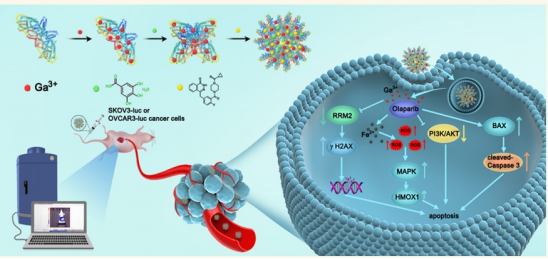International joint research led by WHZJU researchers reveals how the self-assembled nanodrug sensitizes homologous recombination proficient ovarian cancer cells to PARPi
Ovarian cancer is one of the most common malignancies of the female reproductive system and the leading cause of gynecological cancer-associated death. Although surgery and adjuvant chemotherapy are possible therapeutic options, the 5-year survival rate of advanced ovarian cancer remains less than 30%. Poly(adenosine diphosphate-ribose) polymerase (PARP) inhibitors for clinical use have greatly improved the survival rates for ovarian cancer patients with homologous recombination repair (HRR) deficiency. However, PARP inhibitors have limited therapeutic efficacy in HRR-proficient cases which account for half of ovarian cancer cases. Thus, sensitizing HRR-proficient ovarian cancer cells to PARP inhibitors is important in clinical practice.
Recently, Dr. XU Junfen and Prof. LYU Weiguo from Women’s Hospital, School of Medicine, Zhejiang University in collaboration with Prof. ZHANG Hongbo from Pharmaceutical Sciences Laboratory of Åbo Akademi University, published an article entitled “Breaking the Iron Homeostasis: A “Trojan Horse” Self-Assembled Nanodrug Sensitizes Homologous Recombination Proficient Ovarian Cancer Cells to PARP Inhibition” in the journal ACS Nano. The findings indicate that designing the olaparib-Ga into a nanodrug formulation is necessary for effective treatment of HRR-proficient ovarian cancer.
The researchers designed an “all-in-one” olaparib-Ga self-assembled nanodrug for the treatment of HRR-proficient ovarian cancer. olaparib-Ga featured an ultrasmall size of 7 nm and exhibited an excellent suppressing capacity on the cell viability of two HRR-proficient ovarian cancer cell lines (SKOV3 and OVCAR3) compared with olaparib alone. The synergistic effect of gallium- (III) and olaparib in HRR-proficient ovarian cancer cells was demonstrated. The enhanced therapeutic effect of olaparib-Ga might be attributable to suppression of RRM2 expression, activation of the Fe2+/ROS/MAPK pathway and HMOX1 signaling, inhibition of the PI3K/AKT pathway, and enhanced cleaved-caspase 3 and BAX protein expression. Furthermore, olaparib-Ga effectively restrained SKOV3 and OVCAR3 tumor growth and exhibited negligible toxicity in vivo.
Overall, this study demonstrates that the olaparib-Ga nanodrug possesses promising clinical application prospects for HRR-proficient ovarian cancer treatment.

Source: Women’s Hospital, School of Medicine, Zhejiang University
Photo credit: the research team led by Prof. LYU Weiguo and Dr. XU Junfen








